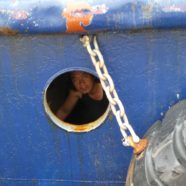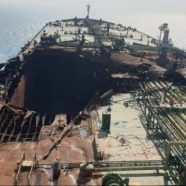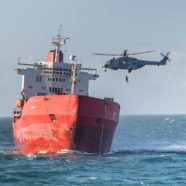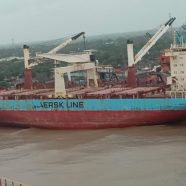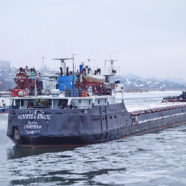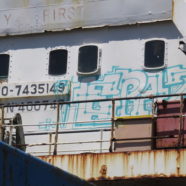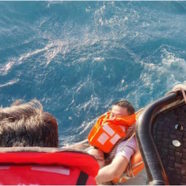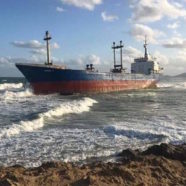What future for the Christos XXIV and the Varzuga ?
Update June 18, 2021
The Christos XXIV returned to sea on Tuesday 15 June at 5pm heading to Las Palmas (Canary Islands, Spain). The 50 year old tug, her 8 Filipino sailors and her 2 Greek officers stayed in Le Havre for 1 month and 8 days.
The Christos XXIV left alone, leaving the Varzuga at Joannès Couvert wharf. Discussions are still ongoing between the owner of the old Russian ship, the maritime authorities and a French demolition yard. The Varzuga will have to be accompanied in the demolition yard by her green passport, which she lacked when she left Murmansk. The green passport is a map with an estimate of the quantities of hazardous materials on the ship at the end of her life.
The Varzuga’s detention should end within 10-15 days.
The International Shipbreaking Show in the Covid-19 gale
“Shipbreaking” # 62
double issue, October-November-December 2020-January-February-March 2021
122 pages, 112 sources, 381 photos
“Shipbreaking” is an unexpected and privileged observatory to analyze the trends of the global business and to identify its shortcomings.
All at sea
The Christos XXIV was towing the Russian oil tanker Varzuga from Murmansk (Russia) to a Turkish shipbreaking yard. On Monday, May 3, 2021, at around 22:00, the tow rope broke and the Christos XXIV lost control of the Varzuga north-west of Cherbourg.
The Christos XXIV / Varzuga convoy left Murmansk on April 17, 2021. It was expected to arrive in Aliaga on May 26 after a 9,000 km journey through the Arctic Ocean, the North Sea, the English Channel, the Bay of Biscay, off Spain and Portugal and the Mediterranean Sea. In Murmansk, just before departure, 7 deficiencies were reported on board the tug by the marine safety inspectors concerning the safety of navigation, the life saving appliances, the radio communications and the pollution prevention.
“Shipbreaking” #61, the International Shipbreaking Show
Issue # 61 of “Shipbreaking” (pdf – 12,8 Mo)
the unique panorama on the end of life of ships and the tricks of globalization.
71 pages, 240 photos, 95 sources
“Shipbreaking” #60, the International Shipbreaking Show
“Shipbreaking” # 60 (pdf – 9.4 Mo)
Bulletin of information and analysis on ship demolition
April, May, June 2020
– The banks are booby-trapped. They’re lending money to ship owners. They think they are protected by a multi-million dollar first mortgage taken out on the ships and sometimes it goes bad. A bank in Hong Kong discovered this by reading “Shipbreaking” # 58, among other things. Ongoing investigation… See p.2.
– The FLOC of the VLOC ex VLCC. The uninitiated will understand what it means by following the crossword in ” Shipbreaking”, p. 5. It’s not safe to convert an oil tanker into an ore carrier.
Nauseas
Trash ships
With one hand, the European Union bans them from its ports because they are dangers publics, with the other one it allows them to be in the trade over and over again in the Eastern Mediterranean, the Black Sea, the Maghreb or faraway seas. Among the facilitators of this tragic double game for crews and damaging to the environment are 7 classification societies based in Greece, Cyprus, Bulgaria and the United Kingdom (1).
“Shipbreaking” #59
The bulletin n°59 could only be special. Robin des Bois tracked derelict and slave ships that prowled the Mediterranean and Black Sea and slipped through the meshes of the surveillance nets. They should urgently be scrapped, but they continue against all odds carrying anything from hashish and explosives to live meat (p. 2-46). In some respects, they benefit by the collusion of the European Union since many of them have as classification societies opportunistic companies established in Greece and Cyprus and acting on behalf of safe and prestigious flags such as those of Togo and Moldavia.





